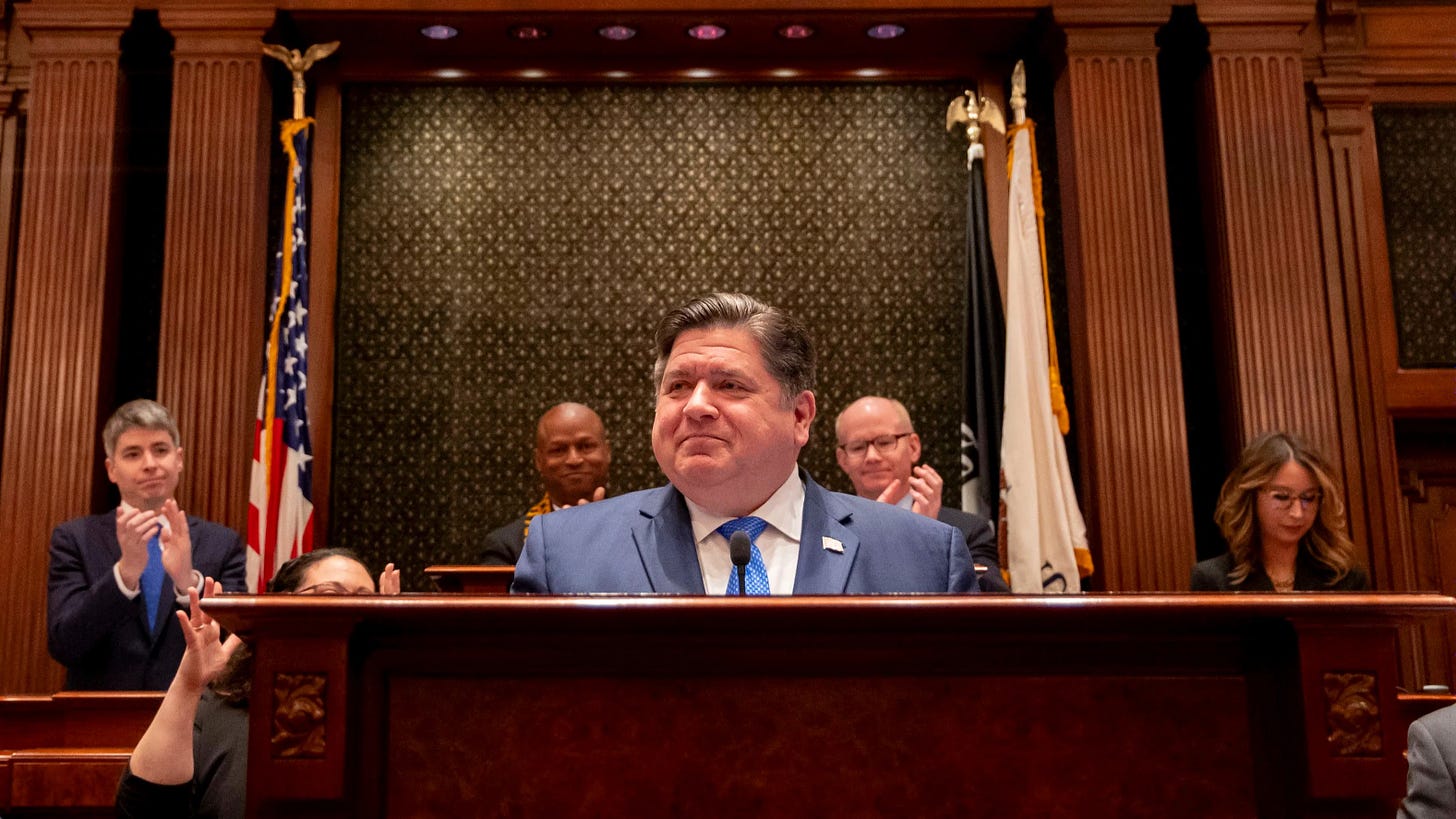THE ILLINOIZE: Thursday Free for All...Pritzker's $900 million in tax hikes...How he's going after insurers...The White Sox pipe dream
February 22, 2024
Good morning, Illinois.
Only paid subscribers got details on Governor Pritzker’s budget at exactly 12:00pm yesterday before he said a word. We’re showing you everyday why being a paid subscriber makes you one of the most in the loop people in Illinois. Join us.
The Senate is in at 10. The House is in at noon. There’s nothing on the Governor’s public schedule today.
Let’s get to it.
YOUR THURSDAY FREE FOR ALL
(note: we’re not responsible for paywalls and restrictions from other news outlets, because good journalism isn’t free)
Gov. J.B. Pritzker’s budget includes almost $900 million in tax hikes — but a break on groceries (Chicago Tribune)
Gov. J.B. Pritzker on Wednesday unveiled a $52.7 billion budget the second-term Democrat said required making “some hard choices” despite proposed additional spending in several areas, from early childhood education to Chicago’s ongoing migrant crisis.
Facing a tighter budget outlook after years of strong revenue performance and multiple credit upgrades, Pritzker is relying on more than $800 million in tax increases that would fall on businesses to bring his spending plan into balance. But he also proposes raising taxes on individuals by reducing the standard exemption for state personal income taxes, which would raise an estimated $93 million by increasing tax bills for Illinois residents.
At the same time, the governor is attempting to position himself on the side of everyday taxpayers with plans to eliminate the 1% sales tax on groceries and create a state child tax credit for low- and moderate-income families.
In his sixth budget proposal, Pritzker also laid out a long-term plan to manage the state’s massive pension debt by increasing the funding target to 100% from 90% and extending the payment deadline by three years, to 2048. The change would not affect the state’s pension payment for the coming year, totaling $10.1 billion from general funds, or roughly 19% of the operating budget.
Acknowledging his spending plan represents the beginning of negotiations with the Democratic-controlled legislature, Pritzker said his proposal “is balanced, and it builds upon all of the progress we have made, paying our pensions in full, investing more in our public schools, social service agencies and health care while addressing the immediate and unique needs of the coming fiscal year.”
“Now, I expect that some of you will want to spend more, and some of you will claim that you want to spend less. Know this: I am always open to good ideas that members of both parties have to more efficiently and effectively fulfill our obligations,” Pritzker said. “My one line in the sand is that I will only sign a budget that is responsibly balanced and that does not diminish or derail the improving credit standing we have achieved for the last five years.”
Related: Pritzker proposes over $2B in spending growth, backed by tax increases for corporations, sportsbooks (Capitol News Illinois)
Sports betting, corporate tax increases to fuel Pritzker's new budget (Crain’s Chicago Business)
Pritzker unveils $52.7B budget proposal, says Biden needs to 'step up' on migrants (Decatur Herald & Review)
Gov. J.B. Pritzker’s ‘more austere’ $52.7 billion budget plan turns to big business, sportsbooks for tax increases (Chicago Sun-Times)
Pritzker’s budget proposal calls for child tax credit, elimination of grocery tax (State Journal-Register)
Illinois governor’s proposed $53B budget includes funds for migrants, quantum computing and schools (Associated Press)
Pritzker calls for health insurance reforms (Capitol News Illinois)
Pritzker’s “Healthcare Consumer Access and Protection Act” will include a package of proposals aimed at controlling strategies that insurers use to reduce the amount of health care patients receive.
It also includes new requirements for insurers to offer enough in-network doctors to meet consumers’ needs, as well as state regulatory control over rate increases in the large group insurance plans similar to regulations lawmakers approved last year for small group policies.
Pritzker says he expects stiff resistance from the insurance industry. But he says he is prepared “to spend serious political capital” to pass the legislation.
“It will save lives and lower healthcare costs for millions of Illinoisans,” Pritzker plans to say.
The first part of the package targets what are often called “utilization management” practices by insurance companies that are designed to control the amount of services a patient receives and steer them toward lower-cost options.
Those include “prior authorization” requirements in which consumers must get advance permission from the insurance company to receive treatment recommended by their doctor. Pritzker will propose banning the use of prior authorization requirements in one specific area of health care – in-patient mental health care for both children and adults – making Illinois the first state in the nation to do so.
Related: Pritzker’s budget includes plan to erase $1 billion in medical debt (Chicago Sun-Times)
Pritzker to propose ending 1% grocery tax in FY25 budget proposal (Bloomington Pantagraph)
Pritzker pitches more than $20 million for initiatives to improve Black maternal health (WBEZ)
Proposed state budget includes $1 million for Route 53 corridor greenway master plan in Lake County (Daily Herald)
Reinsdorf says Sox need a new stadium to compete — and stay in Chicago (Crain’s Chicago Business)
If Chicago is to keep the White Sox from moving out of state — and the team is to be a consistent game winner — it must have the revenue and lures that a new stadium would provide.
That’s the pitch from White Sox chairman and principal owner Jerry Reinsdorf, who provided key new details about why and how the team wants to decamp from Bridgeport’s Guaranteed Rate Field to a new, publicly owned stadium built on Related Midwest’s The 78 property in the South Loop.
Reinsdorf argued that his goal is not to make money but field a winning team — in Chicago.
Regarding his own team's fortunes and his hopes for a state-sponsored stadium, Reinsdorf notably:
• Said financing the stadium would require not only $1.1 billion in subsidies from an existing tax on Chicago hotel rooms but also up to $900 million in infrastructure work that already has been authorized but not funded by a tax-increment financing district that covers The 78 property. Such a move, however, will require legislative and possibly City Council approval.
• Indicated he’s on a fast track, hoping to begin preliminary construction work later this year and play in the new stadium by the 2028 season.
• Conceded that the Sox and the Bears may be competing for the same public-revenue source, the hotel tax, to pay for new Chicago arenas, but said the two family-owned teams are trying to work out a mutually beneficial deal. One thing that’s off the table: sharing a stadium. “It doesn’t work,” Reinsdorf said. “You end up having a stadium that is no good for football or baseball.”
• Said he’s unsure what will happen to Guaranteed Rate and adjoining parking lots if the Sox move downtown. Constructing hundreds of new housing units and retail space is one possibility, and converting the stadium itself into a smaller home for the Chicago Fire soccer team is another possibility, he said.
Related: Reinsdorf finds state lawmakers ‘very cordial’ as White Sox seek $1B for South Loop ballpark: ‘I’m always positive about everything’ (Chicago Sun-Times)
White Sox Chairman Jerry Reinsdorf takes his case for a new stadium to Springfield (Chicago Tribune)
Johnson cracks door open to subsidizing White Sox stadium at The 78 (Chicago Sun-Times)
Editorial: The public’s price of admission for new White Sox stadium: $400 million in state tax revenue (Chicago Sun-Times)
Opinion: Jerry Reinsdorf wants $1 billion in public funds to build ballpark for White Sox? Now that’s rich. (Chicago Sun-Times)
TOP STORIES ON THEILLINOIZE.COM
POLITICAL POTPOURRI
Harmon-affiliated PAC loses appeal of massive fines for not timely reporting campaign spending (Chicago Tribune)
Transmission line monopoly back on agenda at Statehouse after Pritzker’s veto (Capitol News Illinois)
Manteno man admits shoving officer, tossing mug at police during Jan. 6 U.S. Capitol riot (Chicago Sun-Times)
Trump backs U.S. Rep. Mike Bost in blow to Darren Bailey in downstate GOP battle for Congress (Chicago Tribune)
In the Illinois 6th congressional district Democratic primary, the war in Gaza emerges as a focal point (Chicago Sun-Times)
U.S. Rep. Danny Davis faces a hard reelection fight as he tackles challenges from four fellow Democrats (Chicago Sun-Times)
Longtime congressman Bill Foster faces multiple challengers in Illinois’ 11th District (WBEZ)
Editorial: Don’t sit out the March 19 primary — too much is at stake (Daily Herald)
Opinion: Power of lawmakers a more important target than lobbyists’ income (Shaw Media)
Opinion: Giannoulias running the same play as predecessors (Champaign News-Gazette)
JOIN US












